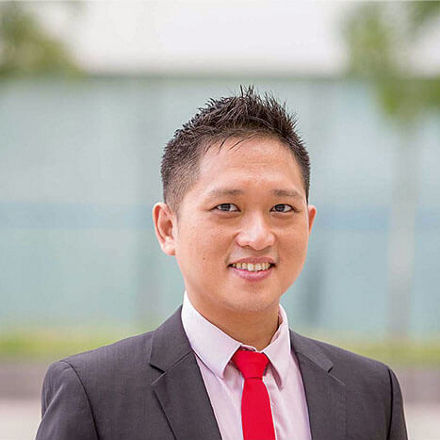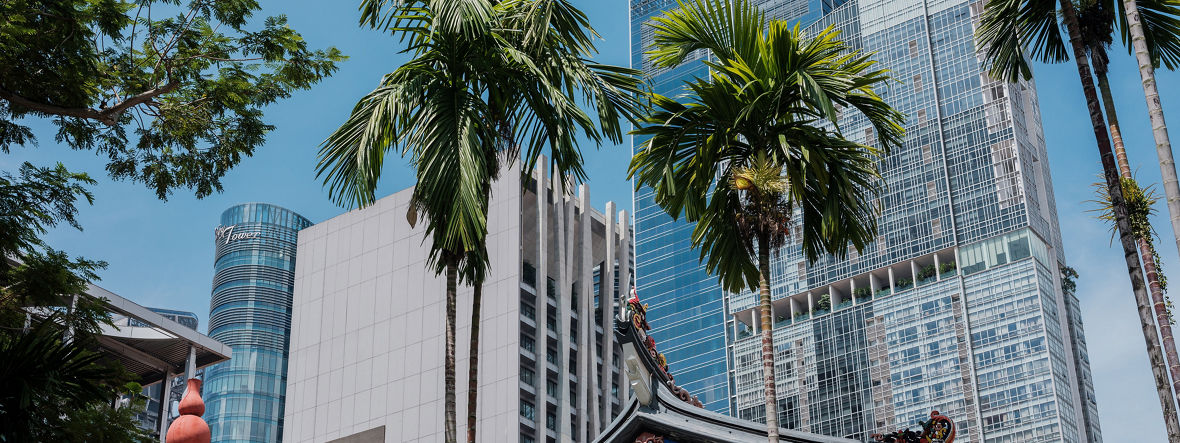Is this a residential high-rise with blue balcony cladding? No, it’s actually a former warehouse that looks like all the other warehouses and factories that were built throughout Asia in the 1970s: plain five-story concrete boxes with massive ramps on the first floor that were used to drag machine tools and textile machines into the halls. The upper floors usually housed unattractive but functional offices that were used to arrange the shipment of rapidly produced everyday items and simple electronic devices to destinations around the world. This was also the way factories were built in Taiwan and South Korea—tiger-state architecture from the days when the Four Asian Tigers were still considered exotic members of the group of industrialized nations.
Today, Block 71 of the “Launch Pad” owned by the government of Singapore is the epicenter of the country’s startup scene. The first people to move into the block, which was set to be demolished just four years ago, were a group of computer nerds who brightened up the building’s facade somewhat. These days, young people wearing hoodies and colorful T-shirts occupy the halls, which have been converted into offices. The rough charm of simple factories has been replaced by an atmosphere very similar to that of the offices in Silicon Valley. No Chinese dialects are spoken here—only Mandarin and English. Block 71 is now the centerpiece of five factory halls that house more than 750 government-funded startups.
Gourab Mukherjee, 32, is the owner of one of these startups—a six-person operation for whose office space he pays around €100 per month in rent. That’s amazingly cheap for a city that is notorious for its exorbitant rents. Mukherjee, who was born in Calcutta, studied computer science in Singapore. Since then he has transformed himself into an entrepreneur with the help of his “Aktivo” health app. “Data that we obtain with a normal fitness tracker can be used to generate relatively precise information about the wearer’s physical condition within 24 hours, as well as a forecast of their life expectancy,” Mukherjee explains. After the data is processed, users are sent nutrition, fitness, and health tips on their smartphones, as well as warnings of acute risks and suggestions for athletic activities and relaxation exercises.

Several insurance companies and major corporations have expressed interest in the app, and a study with 9,000 test subjects is scheduled to be conducted in India this summer. The money needed for this study—nearly €400,000—is being provided by government programs and an American investor. “We would never have gotten off the ground without the generous funding from the government and the outstanding infrastructure we have here,” says Mukherjee. In fact, it only took Mukherjee one day to set up his company and open a corporate bank account.
ELEMENTS-Newsletter
Get exciting insights into Evonik's research and its social relevance – conveniently delivered to your inbox.
BENEFITING FROM INNOVATIVE STRENGTH
An analysis of 10,000 startups conducted by the US organization Genome found that Singapore is number one in the world, and thus ahead of Silicon Valley, when it comes to the availability of up-and-coming professionals. The study also found that Singapore has the world’s youngest entrepreneurs—their average age is 28. Innovative government policies, solid entrepreneur networks, and a business-friendly environment have all contributed to the startup boom in Singapore.

»We’re utilizing a holistic research concept«
Dr. Ronny Sondjaja Manager Evonik Research Center Singapore
Evonik is also looking to benefit from the innovative strength of this island nation. The Group opened its first research center in Singapore in April 2018. The new facility is focusing on resource efficiency, with as many as 50 top researchers and engineers working on the development of innovative ideas and groundbreaking products in this field. The research center is managed by Ronny Sondjaja, 39, a chemical engineer from Indonesia. “We’re utilizing a holistic research concept here,” Sondjaja explains. “This is our first attempt to use Asia as a base for initiating innovative activities and projects.”
Evonik has also launched a Tissue Engineering Project House in Singapore. Some 20 scientists at this facility are developing reliable solutions for tissue regeneration after accidents or illnesses, for example.

All of these research activities are based at the Biopolis research complex, which also houses the renowned National University of Singapore. The university is partnering with Evonik on the development of techniques for regenerating bone and tissue. Biopolis is also home to the largest group of 3D printers on the planet. “Singapore offers ideal conditions for young talents in the natural sciences,” says Peter Meinshausen, Regional President of Evonik Asia Pacific South.
AN ARCHITECTURAL DREAM COME TRUE
The five futuristic skyscrapers in Biopolis—in which new types of cancer treatments are being studied, among other things—are an architectural dream come true for Singapore’s planners and politicians as regards their vision for science and research in the city-state. The five ultramodern buildings were constructed between 2004 and 2014 at a brownfield site not far from the city’s trendy Holland Village neighborhood. The first tower was designed by the star architect Zaha Hadid.
Today, metal pedestrian bridges wind their way like spider legs out of this blue glass structure and into adjoining buildings, where researchers in white lab coats stroll through the corridors—and schoolchildren sometimes visit to get a glimpse of the future. Here life, work, leisure, and top-notch research have been intentionally united over an area of more than 300,000 square meters in an “air-conditioned future mall.”

During lunchtime in the canteens, which were designed with Singapore’s famous and exotic hawker center cookshops in mind, the world’s leading researchers can be seen talking to curious and eager students from nearby universities. Just a subway stop away from here, the five skyscrapers of Fusionopolis rise into the tropical sky. Whereas Biopolis specializes in biochemistry, the natural sciences, and medicine, the breathtakingly bold curving buildings of Fusionopolis have been designed to lure computer nerds and digital experts to Singapore. The “towers of the future” in Fusionopolis are designed to be an even more open meeting place for researchers and residents—between the future and the present—than Biopolis. It’s therefore not surprising that Fusionopolis is home to music schools and ballet studios as well as world-renowned computer firms. The planners of the complex wanted to eliminate the boundaries between high tech and daily life.
On the subterranean floors of the research towers, young and old come together in huge underground food courts. A constant temperature of 21 degrees Celsius is maintained here, which makes eating, strolling, meeting, and learning a more comfortable experience here than outdoors, where the average temperatures range from 28 to 34 degrees Celsius—365 days a year.
RAW MATERIAL: KNOWLEDGE
Lee Kuan Yew (1923–2015), the visionary politician who established the city-state of Singapore after it declared its independence from Great Britain, realized early on that the only raw material the island nation possessed was the diligence and thirst for knowledge of its majority Chinese population. Soon after it was founded in 1965, Singapore quickly became a banking center, and it also built the first refinery in Southeast Asia.
The “National Computerisation Plan” was announced in 1981. Today this tiny island nation on the southern tip of the Malaysian Peninsula is the world’s fifth-largest exporter of electronic products. Internet connections in Singapore boast speeds of up to 135 megabits per second, which is ten times faster than the common Internet speeds in Germany.

In 2014 the government of Singapore presented an ambitious plan to transform the country into the world’s first “Smart Nation.” Among other things, the plan calls for Singapore to become the startup capital of Asia with the help of massive support from government agencies. “By consolidating the efforts of government agencies and providing targeted support to startups, we want to become the location of choice for young entrepreneurs in Asia,” says Koh Poh Koon, Senior Minister of State at Singapore’s Ministry of Trade and Industry. The government is providing nearly €20 billion in funding for various programs in order to make this happen. According to the government, Singapore is now home to more than 50,000 startups.
Such factors also figured into the decision at the end of 2017 to make Singapore the first German Accelerator location outside of the USA. The German Accelerator program, which is being supported by Germany’s Ministry for Economic Affairs and Energy, has three programs running in parallel in Boston, San Francisco, and New York.
COMING SOON: FLYING TAXIS
More than 5,000 of the startups in Singapore focus on advanced technologies. Pang Kin Keong, Permanent Secretary in Singapore’s Ministry of Transport, recently announced that government agencies and a Russian startup plan to start testing flying taxis in the near future. Google is now testing merchandise delivery drones on the campus of the National University of Singapore.
The government of Singapore assumes between 50 and 70 percent of the initial costs for each promising concept developed by any startup in the country. Although this funding is capped at around €126,000, it can be applied for three times per project. Most startups are also granted full tax-exempt status for at least five years.
“Probably no other country in the world offers so much government funding to startups,” says Tom Ludescher, the 39-year-old Chairman of the Swiss Chamber of Commerce. Ludescher advises startups and also serves as an instructor for insurance topics at the University of St. Gallen’s campus in Singapore.

There are numerous exchange and cooperation programs between universities in Singapore and academic institutions all over the world. The National University of Singapore, which is an Evonik research partner, has 183 partnerships with universities in 44 countries, for example. In addition, the Campus for Research Excellence and Technological Enterprise (CREATE) in Singapore houses research centers operated by world-renowned universities such as MIT, the Swiss Federal Institute of Technology (Zurich), the Technical University of Munich, Ben-Gurion University, and the University of California, Berkeley.
“What makes this city so special,” says Ludescher, “is that it’s constantly reinventing itself.”
An Innovation Incubator
Proximity to universities, good infrastructure, and an open-minded culture—various factors come into play when an innovation hotspot is created. The leading startup culture—in fact, the mother of all startup cultures—is still Silicon Valley, which accounted for 25 percent of all global venture capital investment in the biotech sector in 2017. However, several cities in Europe, the Middle East, and Asia are now giving Silicon Valley some competition. The innovative strength of Tel Aviv, for example, is driven by outstanding incubator programs that were established by the Israeli government in the 1990s to make the country more attractive for well-educated Russian immigrants. Israel’s startup culture also benefits heavily from the country’s compulsory military service, which serves as a stepping stone to Silicon Wadi. Europe’s startup scene is now increasingly moving from London to Berlin, in large part due to the looming shadow of Brexit. In fact, a new digitally focused startup is founded in Berlin once every 20 hours.
Sources: Berlin Business Location Center, Deutscher Start-up-Monitor, DIHK: Industriestandort Deutschland, The Economist, Frankfurter Allgemeine Zeitung, Global Startup Ecosystem Report 2018, Süddeutsche Zeitung, Die Welt, Wirtschaftswoche



